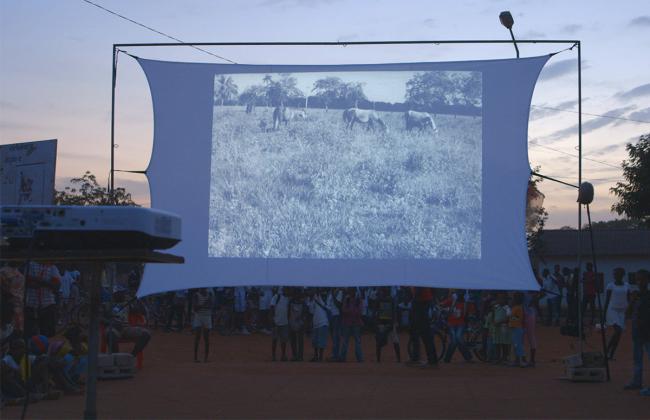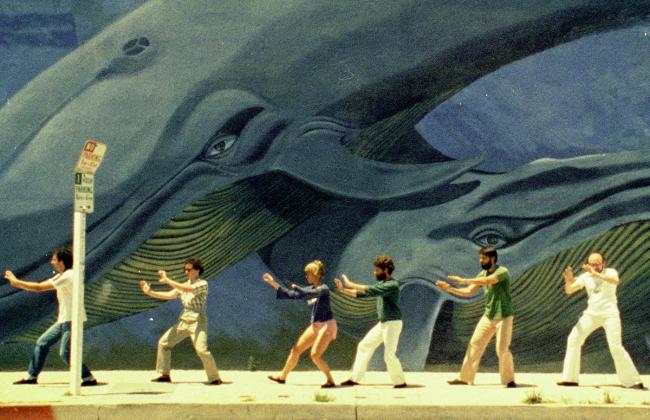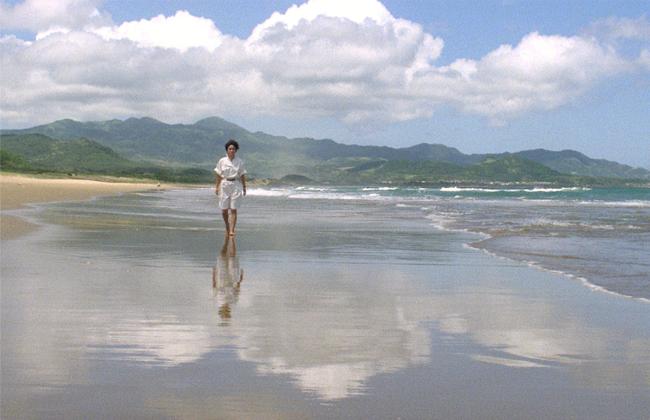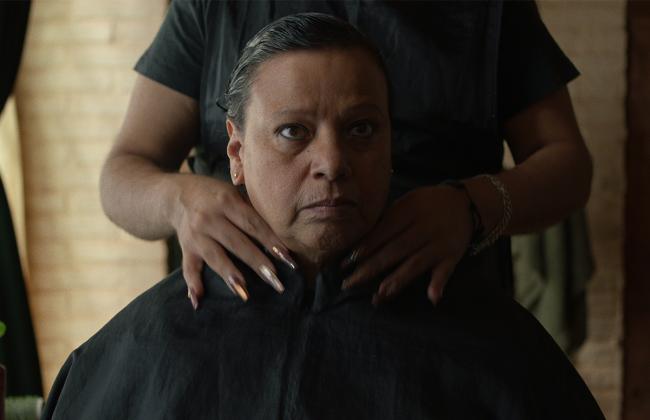The Amazing International Films at BAMPFA This Spring
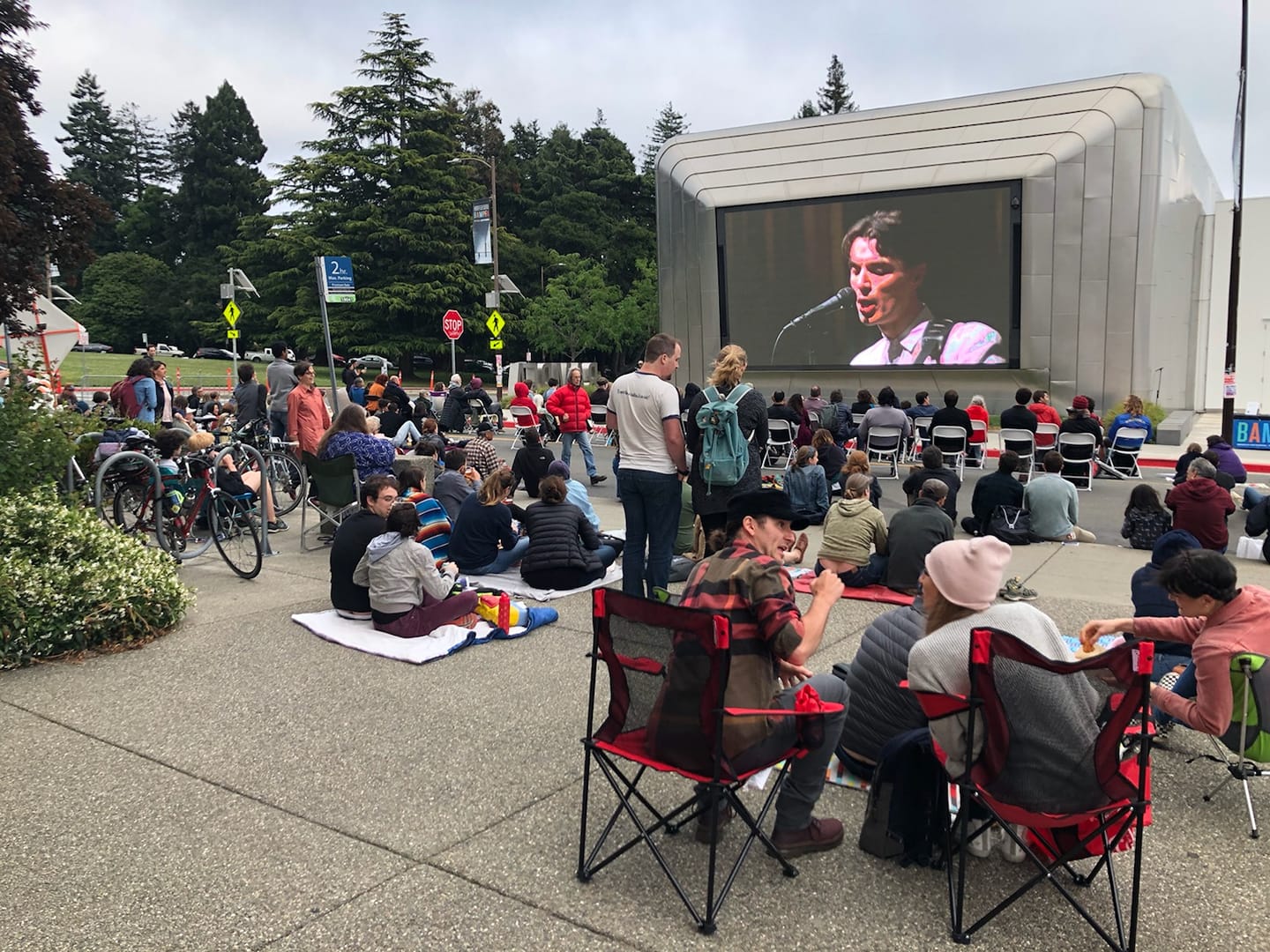
Tom Lehrer famously sang “Spring is here, A-suh-puh-ring is here, life is skittles and life is beer.” But whereas poisoning pigeons in the park helped Lehrer make the season complete, there are far less lethal ways cinephiles can celebrate the Spring season at the Berkeley Art Museum Pacific Film Archive (hereafter BAMPFA).
The BAMPFA Spring Quarter’s big event will be the “67th San Francisco International Film Festival At BAMPFA (April 25-28, 2024).” However, even before that annual event comes along, BAMPFA’s own film series for this season offers a mix of reliable favorites and timely programs. Some of the film series subjects include: a look at the interconnection of war and cinema; tributes to world cinema giants Edward Yang, Ousmane Sembene, and Agnes Varda; and local director Nicolas Pereda curating a look at the best of recent Mexican cinema.
A good starting point for this quarter’s BAMPFA preview will be an event for those lacking Amazon Prime access. Unless a viewer had such access, they could not have seen Barry Jenkins’ acclaimed adaptation of Colson Whitehead’s The Underground Railroad. Now the BAMPFA film series “Barry Jenkins Presents The Underground Railroad (March 15-17, 2024)” presents the entire 10-part adaptation over one weekend. Barry Jenkins himself will appear in person for each screening. Equally importantly, the episodes will screen uninterrupted, a blessing for those wanting to avoid the forced commercial breaks Amazon has now made part of the Prime Video viewing experience.
Local Journalism for Working stiffs
We write for the poets, busboys, and bartenders. We cover workers, not ‘tech’, not the shiny ‘forbes 100 bullshit’. We write about the business on your corner and the beer in your hand. Join the Bay's best newsletter.
For those unfamiliar with the series, Cora is a woman born enslaved on a Georgia plantation. One day she decides to flee the plantation via the Underground Railroad. In the alternate 19th-century South of the story, that railroad is a literal subterranean train service that fugitive slaves board to find freedom. In Cora’s case, though, a determined slave catcher (Joel Edgerton) is hotly pursuing her.
Another Spring film series connected to a book is “In Focus: The Fatal Alliance–A Century Of War On Film (March 6-27, 2024).” This series, based on celebrated film historian David Thomson’s new tome The Fatal Alliance, uses changing film treatments of war to show how these 20th century conflicts became inextricably linked with the cinema. Thomson himself will appear in person to host the series.
The four films to be shown are: “A Man Escaped (March 6, 2024)” (Robert Bresson emphasizes the psychological drama in this adaptation of the true story of a Resistance leader who escapes from a Nazi prison in Lyon mere hours before his execution); “Paths Of Glory (March 13, 2024)” (Stanley Kubrick directs this searing drama about three ordinary French soldiers fingered as scapegoats for the failure of the French generals’ bad decision to order a suicidal attack against superior German forces); “They Shall Not Grow Old (March 20, 2024)” (Peter Jackson celebrates the centennial of World War I’s end with this film which uses applied digital restoration and recoloring techniques to turn old silent newsreel footage into a snapshot of a now long-gone age); and “1917 (March 27, 2024)” (Two World War One British lance corporals rush behind enemy lines to stop an impending British attack before it becomes a slaughter at the hands of German artillery).
A different sort of conflict, one to free a country from the political and cultural yokes of colonization, gets recounted in the films comprising the series “Tell No Lies: Decolonizing Cinema In Angola, Cape Verde, Guinea-Bissau, and Mozambique (March 2-April 24, 2024).” The series’ title comes from anticolonial leader Amilcar Cabral’s call to practice a revolutionary democracy. The anticolonial films featured in this series were part of a program to use cinema to educate its audiences in decolonization. Whether these films revealed history as it unfolded or reconstructed stories or histories confronting colonial occupation, they helped birth a new type of African cinema.
Filipa Cesar’s “Spell Reel (April 23, 2024)” uses as raw material decaying audio and video footage originally recorded during Guinea-Bissau’s fight for independence from Portugal and now digitized. The restored footage was then transported to the places where it was originally shot and publicly shown to audiences. The audiences’ commentary on seeing this restored material becomes part of the film.
Sarah Maldoror’s “Sambizanga (April 7, 2024)” was one of the first African feature films shot by a woman. The film’s title refers to a Luandan suburb that’s home to a prison for political prisoners. It’s the fictionalized story of a man who gets arrested as part of the Portuguese authorities’ increasingly repressive crackdown and “accidentally” dies in prison. Yet his involvement in the Angolan resistance movement is a mystery to those around him. The events of this film take place a few weeks before the Sambizanga uprising, the first act of what will become the Angolan resistance movement. Maldoror’s film wound up getting banned by the colonial authorities until after the country was liberated.
Margarida Cardoso’s documentary “Kuxa Kanema: The Birth Of Cinema (March 21, 2024)” recounts the work of Mozambique’s National Institute Of Cinema. In the wake of the country’s achieving independence, President Samora Machel ordered mobile teams from the Institute to travel around the country to produce weekly newsreels titled “Kuxa Kanema.” These newsreels for and about the people would help ordinary Mozambicans engage with the idea of what it means to live free in a newly independent nation.
Some of the films in the “Tell No Lies” series also show up as part of the tail end of the “Documentary Voices 2024 (February 7 – April 24, 2024) film series. As the title suggests, the series is a mix of contemporary, historical, and innovative documentaries from around the world.
One such film is “Syria: Snapshots of History In The Making (March 6, 29024). It’s the work of the independent and anonymous Syrian documentary film collective called Abounaddara. Using a style they call “utopian realism,” their short films of the country’s revolution mixes scenes of daily life, self-questioning by people, and the influence of the region’s traditional arts to create a diary of a people enduring the changes that come with any revolution.
Another historical documentary draws on a unique cache of material: a collection of twenty films kept in the Tokyo home of a Japanese scholar. These films recounted over nearly twenty years the story of Palestine’s struggle for justice in a variety of styles ranging from straight reportage to short fiction. Director Mohanad Yaqubi edits together excerpts from these films without cleaning off signs of wear or the different layers of dubbing and subbing used over the years. The result is a new addition to the collection: “R21: aka Restoring Solidarity (April 3, 2024).”
Though Ray Guerra’s “Mueda, Memory and Massacre (April 17, 2024)” was made in 1979, it’s a legitimate part of this series thanks to a new digital restoration. This film is Guerra’s record of a regularly staged reenactment by Mozambican locals of the 1960 Mueda massacre, the event that would trigger Mozambique’s war of independence. When peaceful demonstrators arrived en masse to protest the arrest of two exiles, Portuguese troops fired on these protesters and wound up killing hundreds of them. Guerra’s film would become the first feature-length film of Mozambican cinema.
Another influential maker of African cinema is Senegalese director Ousmane Sembene. The BAMPFA celebrates the centenary of the dean of African cinema with the “Sembene 100 (March 3 – April 21, 2024)” film series, whose offerings are either 4K digital restorations or 35 mm archival prints. Sembene’s films gave viewers around the world a fuller picture of Senegalese culture and history, and influenced several generations of African filmmakers. The themes of Sembene’s films include the legacy of French colonial domination, tensions between African traditions and inherited Western values, and the influences of Islam and Christianity on the region.
The films being shown in this series include: “Sembene! (March 3 & 22, 2024)” (a film about the director’s life co-helmed by his colleague and biographer Samba Gadjigo); “Black Girl (March 7, 2024)” (this winner of the 1966 Cannes Film Festival’s Jean Vigo Prize tells the story of Diouana, a Senegalese domestic servant whose mistreatment by the French Madame has her feeling she lives as a virtual slave on the French Riviera); “Xala (March 31, 2024)” (wealthy businessman El Hadji’s plans to celebrate the wedding night with his third wife get rudely curtailed when he develops a case of xala (impotence), yet his affliction soon becomes the basis for a metaphorical critique of contemporary Africa); ”Guelwaar (April 13, 2024)” (when the corpse of a murdered Catholic political activist is given a Muslim burial, the activist’s family’s efforts to retrieve the corpse nearly lead to a literal holy war); and the must-see Cannes Film Festival Un Certain Regard Grand Prize winner “Moolaade (April 21, 2024)” (Colle’s outrage over the brutality of female circumcision leads her to offer moolade (sanctuary) to a quartet of young girls fleeing salinde (the circumcision ceremony)).
Is it a good time to celebrate French New Wave director Agnes Varda and her work? The simple answer is that it’s always a good time to celebrate this individualistic filmmaker. The spark for this quarter’s celebration “Viva Varda! (March 23 – May 5, 2024)” is a new documentary of the same name about the late director. Pierre-Henri Gilbert’s film sheds new details about Varda’s early life and her rebellious sensibilities, supplemented by never-before-seen archival footage.
Newbies to Varda’s work can’t go wrong with the delightful “Cleo From 5 to 7 (March 29, 2024)” or the chillingly powerful “Vagabond (April 11, 2024).” For those who want to try out some of Varda’s documentaries, “The Gleaners And I (April 14, 2024)” (on the art of living off others’ leftovers) or “Faces Places (May 5, 2024)” (a delightful road trip through rural working-class France and the friendship between kindred spirits of two different generations) are great places to start.
For those who are already familiar with those Varda classics, there are some lesser-known (but no less worthwhile programs) to check out.
The “Mur Murs & Documenteur (May 4, 2024)” program is one such must-see. “Mur Murs” uses an examination of Los Angeles’ street murals circa 1980 as an entry into examining the subcultures of the City of Angels. Along the way, the viewer will see such classic murals as Judy Baca’s “Great Wall Of Los Angeles” and Kent Twitchell’s pop culture version of the Holy Trinity. “Documenteur” is Varda’s autobiographical and very emotional Los Angeles-set drama about a French woman “suffering from exile” while living with her young son.
The “Agnes Varda Shorts, Program 2 (April 20, 2024)” is filled with delightful short surprises. They include “Agnes Varda–Pier Paolo Pasolini–New York–1967” (a posthumously completed film made by Varda and Pasolini at the time of the 1966 New York Film Festival), the Bay Area-themed shorts “Uncle Yanco” (portrait of Varda’s relative, Sausalito artist Jean Varda) and “Black Panthers” (captures some of the time’s “Free Huey” rallies and appearances by such Panthers as Newton and Kathleen Cleaver), and cat lovers will love “Tribute to Zgougou.”
Agnes Varda goes semi-philosophical with her drama “Le Bonheur (Happiness) (May 1, 2024).” Francois, a carpenter, is happy loving both his wife and his mistress. He figures that the three of them can share a life together. Yet is that belief based on reality or on shortsightedness centered solely on his own needs and desires?
People dealing with the clash between their personal needs and that of society (or at least a larger group) turns out to be a key theme of the celebrate Taiwanese New Wave director Edward Yang. His films get a revisit in the mini-series “Edward Yang’s Taipei Stories (March 1 – April 20, 2024).” Aside from such acknowledged Yang classics as “A Brighter Summer Day (March 23, 2024)” and “Yi Yi (April 20, 2024),” the series features such notable Yang titles as “That Day, On The Beach (March 1, 2024)” (the feature debuts of both Yang and cinematographer Christopher Doyle is the story of a reunion between a concert pianist and a successful businesswoman, which leads to revelations about these two friends’ personal histories) and “A Confucian Confusion (March 27, 2024)” (an ensemble satire about the Taiwanese economic boom of the mid-1990s, focusing on a group of 20-ish Taiwanese yuppies living the society’s capitalist dream without finding happiness in being part of the country’s nouveau riche).
Curious about the state of independent film in Mexico? Let UC Berkeley professor and filmmaker Nicolas Pereda introduces viewers to some of his favorite recent Mexican movies via his series “Nicolas Pereda Selects: Recent Films From Mexico (March 20 – May 2, 2024).”
What links the films Pereda has selected for this series? Their storytelling experiments with formal storytelling techniques and use distinct rhythms and structures that finesse commercial cinemas’ thematic constraints. These films also look at big picture social, political, and/or environmental issues without ignoring the characters’ interior lives. And that all of the films but one was directed by a woman indicates a willingness to experiment with storytelling and such like.
Some of the films Pereda has selected include: “Tragic Jungle (May 2, 2024)” (who is the female prisoner held by a group of 1920s indigenous laborers working in the Mayan jungles between Mexico and British Honduras: a Belizean woman who might be a fugitive from a rich British landowner…or the Mayan demon and man-killer Xtabay), “Totem (March 30, 2024)” (seven-year-old Sol’s father is getting a birthday celebration, but the little girl might be unaware why the family’s future has become uncertain), and the Sundance Acting Award-winning “Dos Estaciones (April 18, 2024)” (the strong-willed owner of a tequila factory struggles to survive such daily challenges as business deals and village celebrations as well as strong challenges from foreign competitors).

Howdy! My name is Katy Atchison and I'm an Associate Editor for Broke-Ass Stuart.
I want to take the time to say thank you for supporting independent news media by reading BrokeAssstuart.com. Supporting independent news sources like Broke-Ass Stuart is vital to supporting our community because it amplifies the voices of a wide variety of diverse opinions. You also help support small businesses and local artists by sharing stories from Broke-Ass Stuart.
Because you're one of our supporters, I wanted to send over a pro-tip.
Our bi-weekly newsletter is a great way to get round ups of Broke-Ass Stuart stories, learn about new businesses in The Bay Area, find out about fun local events and be first in line for giveaways.
If you’d like to get our newsletter, signup right here, it takes 5 seconds.


